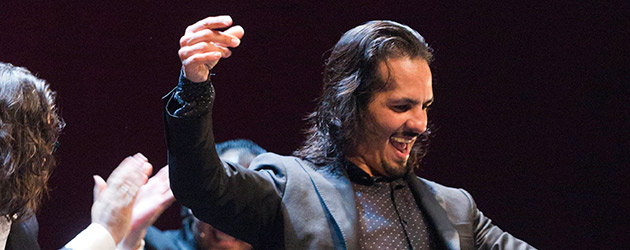Texto: Rufo
Fotos: Jesús Umbría (Festival Suma Flamenca)
Dance: Juan Manuel Fernández Montoya, «Farruquito»
Cante: Antonio Villar, Manuel Zambullo, Mari Vizarraga – Guitar: Román Vicenti, José Gálvez. Percussion: Antonio Romero «El Polito».
Teatros del Canal – Sala Roja – June 19th, 2016
Farruquito, “king” of gypsy dance
As we all know, according to the great investigators and oral tradition, flamenco is an amalgam of music and cultures that came together mostly in Andalusia. One need only interpret the historic verses to see it is an art born of the need of a people, principally Andalusian gypsy. I have always believed this, and subscribe to writings of the era when the words «flamenco» and «gypsy» were synonymous. Gypsies have employed the art-form to somehow express their emotional manifestations. The very essence of flamenco is the lack of a pre-established script. But of course, flamenco dance, since the beginning of time, received the influence of other disciplines, and requires scripting in order to appear on stage. But what if we take the intimacy of a gypsy household to the theater stage? Spontaneous fiesta in a show where each performance is different from any other, that's «Improvisao», the show which Farruquito presented at Suma Flamenca last Sunday in the Sala Roja de los Teatros Canal. With this show the man from Seville aims to emphasize the most authentic kind of flamenco dance, the kind in which you never know what might happen, and which depends more on the state of mind of the interpreters than on rehearsals. In other words, the kind of flamenco he's been soaking up since he was in his mother's belly.
With the theater full, and a somewhat warmer audience than the first day, things got underway with a declaration of intent by the dancer. The dancing of Juan Manuel Fernández Montoya is today the summit of this line of flamenco. Each time he dances, he certifies his glorious reign. There's a saying in soccer that I love, and which comes to mind to describe the art of this young dancer: there are those who have technique and supernatural ability, and there are those whose score goals. Farruquito has it all.
Perhaps the people mostly applauded his acrobatic capacity, paying less attention to what this old man trapped in a young body, current king of gypsy dance, really does. I'm talking about his way of dancing nearly without moving, his hands fixed in the air, the way his positions himself, his forms, his knowing how to be at every moment, the way of transmitting with his facial expressions and of course, the crisp resolution of movement everyone tries to copy. True genius. The school began with his grandfather, dancer of dancers, but the young man has been able to reinvent it and create his own language based on that background. It's also surprising to see the influence of Pilar López which Farruquito has somehow managed to get through old Farruco himself. Not all his formation was gypsy.
I could describe the show in full detail, but I think it's better to explain impressions. He did everything well, from the tonás and siguiriyas, to the final bulería, passing through cantiñas. But without a doubt, it was the soleá where he laid down the law, carrying his dance to the highest level with cantes of Enrique el Mellizo and Chozas de Jerez in the visceral voices of Manuel Zambullo and Antonio Villar. Mari Vizárraga was another high point of the night, her singing and expressivity spoke eloquently to the audience. And what can I say about the guitarrists, Román Vicenti, the music of Farruquito, and José Gálvez, who provided the unmistakable aroma of Jerez. Handling the percussion was his cousin, also a dancer, Polito, who left no doubt about his abilities in the fiesta finale. And what impressive dancing that of José Gálvez! Tight like a bullfighter, like Diego de la Margara himself. And thus, with Mari singing things of Paquera, and Farruquito and Polito dancing together, the curtain came down, sealing the supremacy of the king.
